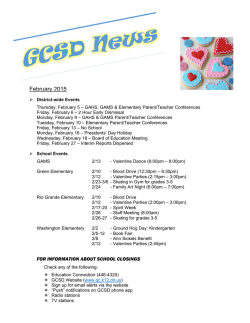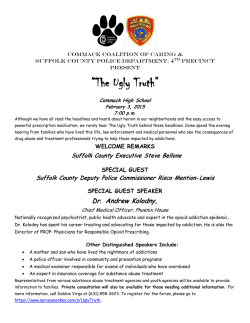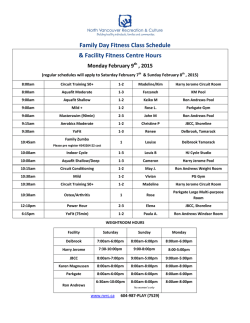
Workshop List - continuingeducationwnc.org
Continuing Education Workshops with Linda Harrison, LPCS, CCS, MAC and John Sanders, MSW, LCSWA, LCAS, CSI Register at www.continuingeducationwnc.org *NBCC Approved Continuing Education Provider* We will be adding more workshops over time, so be sure to check the website frequently as this list may not be complete. Using Positive Psychology to Help Individuals Develop and Maintain Long-Term Recovery $25.00 Friday January 30, 2015 1:00pm - 4:00pm 3 Contact Hours -- NCSAPPB approved substance abuse specific (SS) and evidencebased treatment (EBT) Traditionally, addiction treatment has been effective at offering short-term acute care to individuals with addiction, such as detoxes and 28-day programs. We can take an individual who is suffering from the many negative affects of addiction and provide care, nourishment, and stability. Further, we have been good at teaching coping skills to assist clients in navigating early recovery. Recently we have seen a shift of focus in addiction treatment to recovery-orientated systems of care. Organizations and individuals across the nation are working to bring awareness of long-term recovery to the national consciousness. So, with a new focus on long-term recovery, it is helpful to have a solid understanding of how individuals transform their lives and flourish in recovery. Most people who have been successful in getting through the acute phase of recovery are struggling with new challenges; such as rebuilding their lives, finding meaningful work, engagement in the community, developing positive relationships, and finding their purpose. In this workshop we will specifically look at the principles of positive psychology and how they can be used to help clients develop and maintain long-term recovery. We will discuss how to integrate positive psychology into your practice, and how it is a perfect compliment to CBT and motivational enhancement therapy. A positive psychology group format will be presented which you can use to facilitate groups. Additionally, we will discuss how integrating positive psychology into your practice will help you increase your job satisfaction and avoid burnout. Presented by John Sanders, MSW, LCSWA, LCAS, CSI _____ Narrative Therapy: Story Telling and Story Visioning $50.00 February 10, 2015 9:00am - 4:30pm 6 Contact Hours -- NCSAPPB approved substance abuse specific (SS) Narrative therapy is a powerful tool to support a client to tell their story and develop new stories from the past, in the present, and for the future. We’ll learn and practice several techniques of Narrative Therapy. We’ll develop a personal story board, use narrative therapy for “group check-in”, and learn a group skill for developing a recovery story. This is a very interactive group so dress comfortably and be prepared to narrate one of your stories in small group! Presented by Linda Harrison, LPCS, CCS, MAC _____ Professional Boundaries for the Substance Abuse Professional $25.00 Friday February 27, 2015 1:00pm - 4:00pm 3 Contact Hours -- NCSAPPB substance abuse specific (SS) and ethics (ETHICS) Breaching professional boundaries is one of the main reasons counselors get in trouble with the practice board. Some professionals are at risk of loosing their license or certification. These breaches also put your agency at risk. Sending your counselors to this training is a smart investment. The workshop will be a mix of presentation and group discussions. Topics covered will include defining professional boundaries, the importance of boundaries, consequences of poor boundaries, and techniques for maintaining healthy boundaries. Scenarios will be presented for discussion. We will review the NCSAPPB’s code of ethics and hold discussions on ethical dilemmas in substance abuse treatment in order to gain a better understanding of how ethics directly affect our decision making process. Attendees are encouraged to bring their own scenarios about professional boundaries for group discussion. Presented by John Sanders, MSW, LCSWA, LCAS, CSI ___ Emotional Regulation: Teaching Basic Skills to Clients $50.00 March 10, 2015 9:00am - 4:30pm 6 Contact Hours -- NCSAPPB approved substance abuse specific (SS) Emotional regulation is a basic recovery skill for both SA and mental health clients to navigate the daily difficulties of life on life’s terms. We’ll examine the most basic regulation skills and then move to learn skills from DBT, Emotional Freedom Technique, and Trauma Resiliency Model. Presented by Linda Harrison, LPCS, CCS, MAC ___ Mindfulness-Based Relapse Prevention $25.00 Friday March 27, 2015 1:00pm - 4:00pm 3 Contact Hours -- NCSAPPB substance abuse specific (SS) and evidence-based treatment (EBT) This training will be a mix of presentation and group discussions. Topics covered will include integrating mindfulness meditation practices with traditional relapse prevention and cognitive-behavioral therapy (CBT). Will will discuss how mindfulness-based relapse prevention (MBRP) can support recovery and a healthy lifestyle. Methods for coping with urges and cravings that can trigger relapse will be presented. We will discuss how MBRP can offer your clients a new perspective in understanding how to maintain long-term recovery. Guidelines for conducting MBRP groups will be presented. Presented by John Sanders, MSW, LCSWA, LCAS, CSI ___ Basic and Advanced Clinical Supervision $75.00 April 7, 2015 8:30am - 5:00pm 7.5 Contact Hours -- NCSAPPB approved clinical supervision specific (CSS) and 1 hour (ETHICS) We’ve all had good and bad supervision…well let’s say helpful and hurtful. My wonderful mentor, the late David Powell explained in one of his trainings, “We’ll provide clinical supervision the way we were parented unless we receive appropriate and compassionate clinical supervision training.” And wow, was he correct! With David’s help, we can all learn a “Blended Model of Clinical Supervision” that draws on evidenced based supervision as well as a more advanced clinical supervision called “Contemplative Clinical Supervision”. We will spend a full 7.5 hours of face to face interactive exploration of your personal style as well as Powell’s “Blended Model of Clinical Supervision”. We’ll begin with basic skills and move on to lend support to the supervisee using a contemplative model. Lot’s of practice time so you leave with integrated skills. Presented by Linda Harrison, LPCS, CCS, MAC ___ EFT (Emotional Freedom Technique) and Practical Meditation $50.00 Tuesday April 14, 2015 9:00am - 4:30pm 6 Contact Hours -- NCSAPPB substance abuse specific (SS) This workshop, like the Wellness workshop coming on May 12th will focus on how the counselor’s wellness skills can also be used with clients. We will focus on learning and practicing the Emotional Freedom Technique, EFT as a self-help skill for one, clearing one’s emotional field on a daily basis (taking an emotional bath) leading to emotional and physical resiliency; two, removing blocks to healing the psyche that prevent full authentic living; and three, developing new beliefs/understandings that come from the quiet core of your highest consciousness in meditation. The last step of EFT leaves the brain and body of the practitioner in a very grounded yet elevated level of consciousness where new beliefs arise that are congruent with one’s highest values. We will identify and record those core values and beliefs creating a new story for living and embracing a holistic life with counseling as our life’s service. Most of this workshop will be practicing EFT so that the skills are well integrated. We will also review the research literature for EFT. This workshop will use specific case studies of dually diagnosed clients to support EFT as a self-help recovery tool. Wear comfortable clothing and be prepared to evolve! OBJECTIVES: • Develop a working skill set in practicing basic EFT. • Learn and practice the CB breathing technique for breaking through blockages that prevent release of emotional attachment. • Develop a working knowledge of the research supporting EFT as a treatment for emotional regulation and trauma treatment. Presented by Linda Harrison, LPCS, CCS, MAC ___ DSM 5 and Diagnosis of Co-Occurring Disorders $25.00 Friday April 24, 2015 1:00pm - 4:00pm 3 Contact Hours -- NCSAPPB substance abuse specific (SS) and psychopathology training (PSY) This training will cover the DSM 5 diagnostic criteria for substance use disorders, and many co-occurring disorders such as depression, anxiety, bipolar, and personality disorders. We will discuss how to differentiate symptoms of substance use and postacute withdrawal from the pathology of other mental disorders. The challenges and ethics of appropriate and responsible diagnosis of co-occurring disorders will also be discussed. Presented by John Sanders, MSW, LCSWA, LCAS, CSI ___ Embracing Wellness: Developing an Action Plan for Healing the Counselor and the Client $50.00 Tuesday May 12, 2015 9:00am - 4:30pm 6 Contact Hours -- NCSAPPB substance abuse specific (SS) *With Special Guest, Audrey Bissiere-Grote of UNCA’s Health and Wellness Program Healing is a parallel process between the counselor and the client. The counselor must build everyday practices for healing into his or her life in order to emulate the positive changes being asked of the client. Healing practices also help us stay grounded and balanced in a stressful profession as well as a very stressful world. Counselor healing and growth also supports objectivity and patience in the counselor-client relationship. A component of the workshop will be Mary Ellen Copeland’s evidenced based Wellness Recovery Action Plan (WRAP). This workshop will examine daily wellness skills that support and heal the body, mind, and Spirit. The same skills that the counselor will learn and integrate will be skills that can also be taught to clients in group/individual counseling sessions, psycho-ed classes, or referred out to area resources in the community. Beginning with a full assessment of your current lifestyle and projected longevity, participants will actually learn and practice how to begin making changes in diet, exercise (both active and passive), mindfulness meditation, home and workplace health, emotional resiliency, genetic disease prevention, alternative treatments, expanding your support network, volunteerism for health, and much much more. Past workshop participants have especially appreciated learning chair yoga for clients and techniques for brain decompression at the end of a long work day. This workshop will highlight a special guest from UNCA’s Health and Wellness Program, Audrey Bissiere-Grote. OBJECTIVES: • Learn and integrate wellness skills that may be used for self-healing as a counselor and with clients. • Develop a working knowledge base of the relationship between wellness and recovery from SA and mental illness. Presented by Linda Harrison, LPCS, CCS, MAC ____ Bloodborne Pathogen Training $25.00 Friday May 29, 2015 1:00pm - 4:00pm 3 contact hours - NCSAPPB Bloodborne pathogens HIV/AIDS/STD/TB/Hep C (HIV) Bloodborne pathogens are infectious microorganisms in human blood that can cause disease. These pathogens include, but are not limited to, hepatitis B (HBV), hepatitis C (HCV) and human immunodeficiency virus (HIV). Substance abuse professionals and other individuals working in health care and mental health treatment may be at risk of exposure to bloodborne pathogens. Additionally, many of our clients will be dealing with past exposure which can cause challenges for healing and recovery. OBJECTIVES: Review the most current information and safety precautions to reduce the risk of exposure. Learn ways to support clients if they have been exposed. Learn about local resources for assisting individuals in managing their health issues. We look forward to seeing you there! Presented by John Sanders, MSW, LCSWA, LCAS, CSI ____ Integrated Dual Diagnosis Treatment $50.00 Tuesday June 9, 2015 9:00am - 4:30pm 6 Contact Hours -- NCSAPPB substance abuse specific (SS) Integrated treatment of both mental illness and substance abuse is evidenced based treatment and will lead to the best possible outcomes. Learn how to assess the consumer for and treat both diagnoses simultaneously. Identify barriers to treatment. Discover how and why it is more difficult for the dually diagnosed client to stay clean and sober. Samples of contracting for sobriety will be available. Lots of dual diagnosis case studies to hone your clinical skills. Walk away with strategies for treatment that will bring immediate results! OBJECTIVES: Develop basic counseling skills that use motivational interviewing to treat both SA and mental illness in dually diagnosed clients. Utilize the interdisciplinary team in contracting and resource building to help clients get traction in treating both disorders as a community treatment model. We look forward to seeing you there! Presented by Linda Harrison, LPCS, CCS, MAC _____ American Society of Addiction Medicine (ASAM) Patient Placement Criteria Review $25.00 Friday June 26, 2015 1:00pm - 4:00pm 3 contact hours - NCSAPPB substance abuse specific (SS) The ASAM provides placement criteria for adolescents and adults entering substance abuse treatment programs. ASAM’s criteria uses six dimensions to create a holistic, biopsychosocial assessment of an individual to use for service planning and treatment. This is the most widely used and comprehensive set of guidelines for placement, continued stay, and discharge of clients with addiction disorders. This training will be an in depth review the six dimensions of the ASAM criteria, the continuum of care, and the intensity of services. We will discuss specifically how to assess a client in all six areas and share real world examples. This training will be part presentation with ongoing discussions and small group activities. We will also discuss local treatment programs and where they fit in the ASAM’s criteria. OBJECTIVES: • Review and develop a good understanding of the ASAM criteria for use in your day-today practice. • Increase proficiency in the skills of assessment, placement and referral. • Develop a working knowledge of local providers and where they fit in the continuum of care. We look forward to seeing you there! Presented by John Sanders, MSW, LCSWA, LCAS, CSI _____ Approved Continuing Education Provider - NBCC FIRST at Blue Ridge and our trainers are the source of all educational services.
© Copyright 2026


